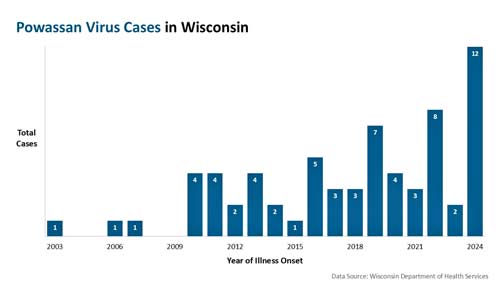July 8, 2025 at 5:50 a.m.
You’ve heard of Lyme disease, but ... What is Powassan virus?
Wisconsin residents are familiar with Lyme disease, but many are hearing about Powassan virus for the first time following reports that a Bayfield County man died after contracting the virus last month.
“As of June 2025, four cases of Powassan virus have been reported in adult Wisconsin residents,” said Linda Conlon, Oneida County Health Department director. “Three individuals were hospitalized, and one of them died. The hospitalization status of the fourth case is unknown.”
 In the past 20 years, Wisconsin has seen the third-greatest number of Powassan cases in the country with 67, trailing only Minnesota (79) and Massachusetts (71). Source: Department of Health Services.
In the past 20 years, Wisconsin has seen the third-greatest number of Powassan cases in the country with 67, trailing only Minnesota (79) and Massachusetts (71). Source: Department of Health Services.(Contributed image)
Powassan is a tick-borne virus spread by the blacklegged (deer) tick, the same tick that spreads Lyme disease, anaplasmosis and several other diseases in Wisconsin.
There have been no confirmed cases of Powassan virus in Oneida and Vilas counties so far this year, according Conlon and interim Vilas County public health officer Melissa Geach, respectively.
Since 2004, Oneida and Vilas counties have each reported two cases, according to Centers for Disease Control and Prevention (CDC) data.
On Thursday, Bayfield County health director Anne-Marie Coy confirmed that a second individual had been diagnosed with Powassan virus that morning, bringing Bayfield’s annual total up to two.
On the uptick
While rare, Powassan can be serious.
“Early symptoms can look like other illnesses: fever, headache, vomiting, or weakness,” Geach said. “In more severe cases, it can lead to neurologic issues like confusion, seizures, or difficulty speaking.”
“Infection can cause a mild febrile illness or neurologic disease that often presents as meningitis or encephalitis,” Conlon said.
“I want all of you to know is we
do have treatments at the Tick Center for Powassan virus.”
Dr. James Thatcher, Aspirus Tick-Borne Illness Center
In 2024, 12 cases of Powassan virus were reported in Wisconsin residents, the highest number of cases reported in the state in a calendar year and the second most cases in the United States after Minnesota, which reported 14 cases last year.
Cases are most common in May, June and July, according to data collected between 2003-2024, with June being the peak month for Wisconsin. That same study shows cases are most common among adults age 55 and older.
As of July 1, the CDC reported three cases of Powassan virus in Wisconsin via its national arboviral surveillance system, though the CDC states that “due to delays in reporting, state, territorial, and local health departments may have more up-to-date information than what is presented here.”
Dr. James Thatcher at the Aspirus Tick-Borne Illness Center said one of the difficulties in treating Powassan virus is first identifying it.
“The trouble is there’s not a lot of good testing. So, most of those patients, they found out by getting a spinal tap weeks later. Then the Powassan virus came back,” Dr. Thatcher said. “So, it can cause a viral encephalitis, which we use this term viral encephalitis, viral meningitis, aseptic meningitis — they all mean the same thing. It means your brain’s on fire, but it’s from a virus. So, Powassan virus can be similar to neurological Lyme [disease].”
The CDC recorded 50 deaths from Powassan virus between 2004-2024. In the past 20 years, Wisconsin has seen the third-greatest number of Powassan cases in the country with 67, trailing only Minnesota (79) and Massachusets (71).
Prevention
Powassan virus is spread to people primarily through the bite of an infected tick, so the best way to prevent Powassan virus is to protect yourself from any and all tick bites.
“We always encourage residents and visitors to take precautions to avoid tick bites,” Geach said. “Simple steps like using insect repellent, wearing long sleeves and pants, and doing tick checks after being outdoors can help prevent not only Powassan but other tick-borne illnesses like Lyme disease and anaplasmosis.”
While insect repellants like Off! or Picardin are readily available, non-chemical options are out there, too.
“There are natural products we can find in the community,” Dr. Thatcher said. “Tick tinctures, if you will, or products like, this STEM spray or there’s No-Bite-Me cream. But there are natural herbs — cedarwood oil, lemongrass, thyme, clove — that help repel ticks, but also the other bugs.”
With its difficulty to detect and potentially fatal outcomes, Powassan virus should be taken seriously. Fortunately, the Aspirus Tick-Borne Illness Center in Woodruff offers treatment.
“The CDC website still says there are no treatments for Powassan virus, but something I want all of you to know is we do have treatments at the Tick Center for Powassan virus,” Dr. Thatcher said. “We’ve done our homework, and we’re prepared for any Powassan cases. So, if you’re bit by a tick, save the tick, put in a plastic bag, Ziploc it, leave it on the side. Get treated for a tick bite.”
Michael Strasburg may be reached at [email protected].



Comments:
You must login to comment.